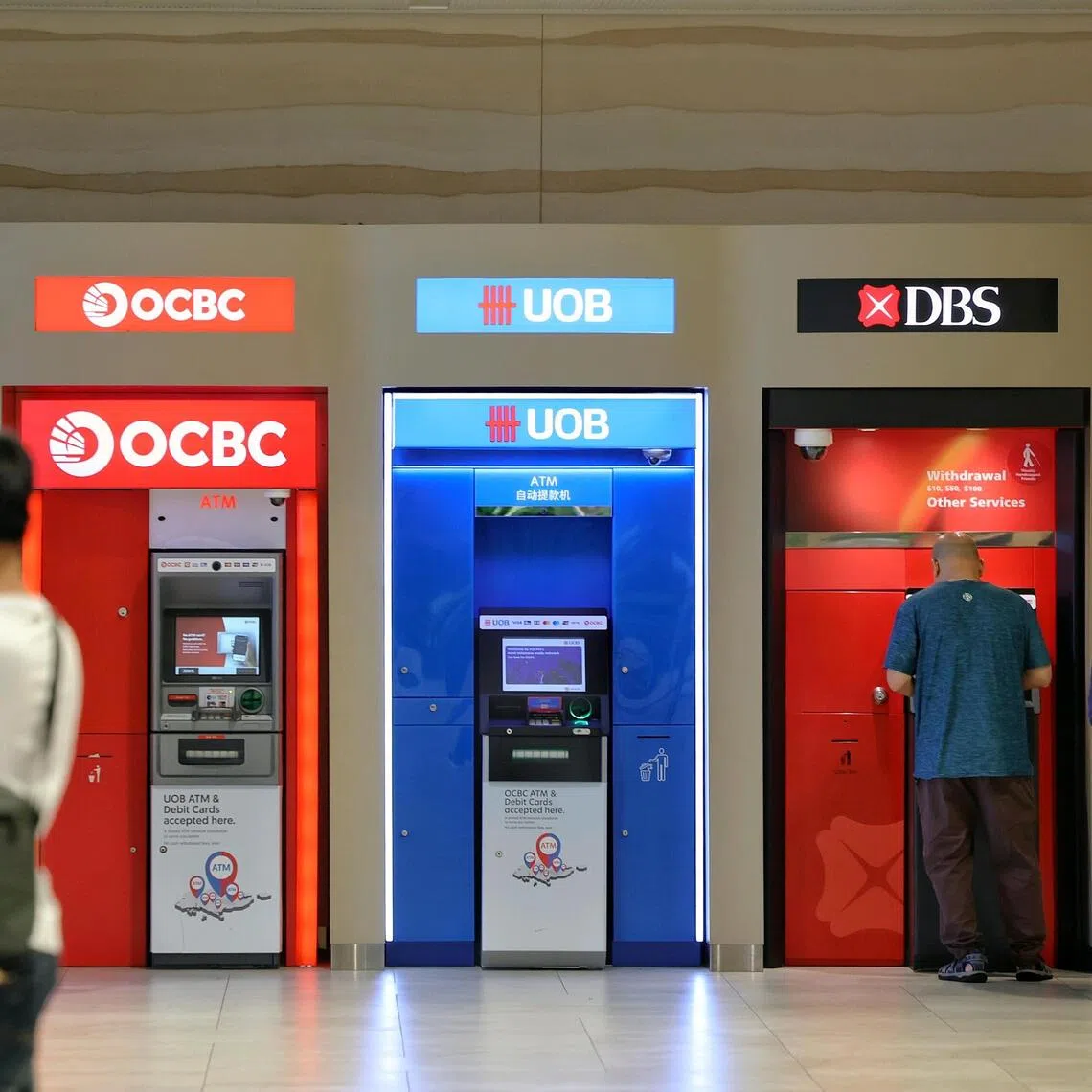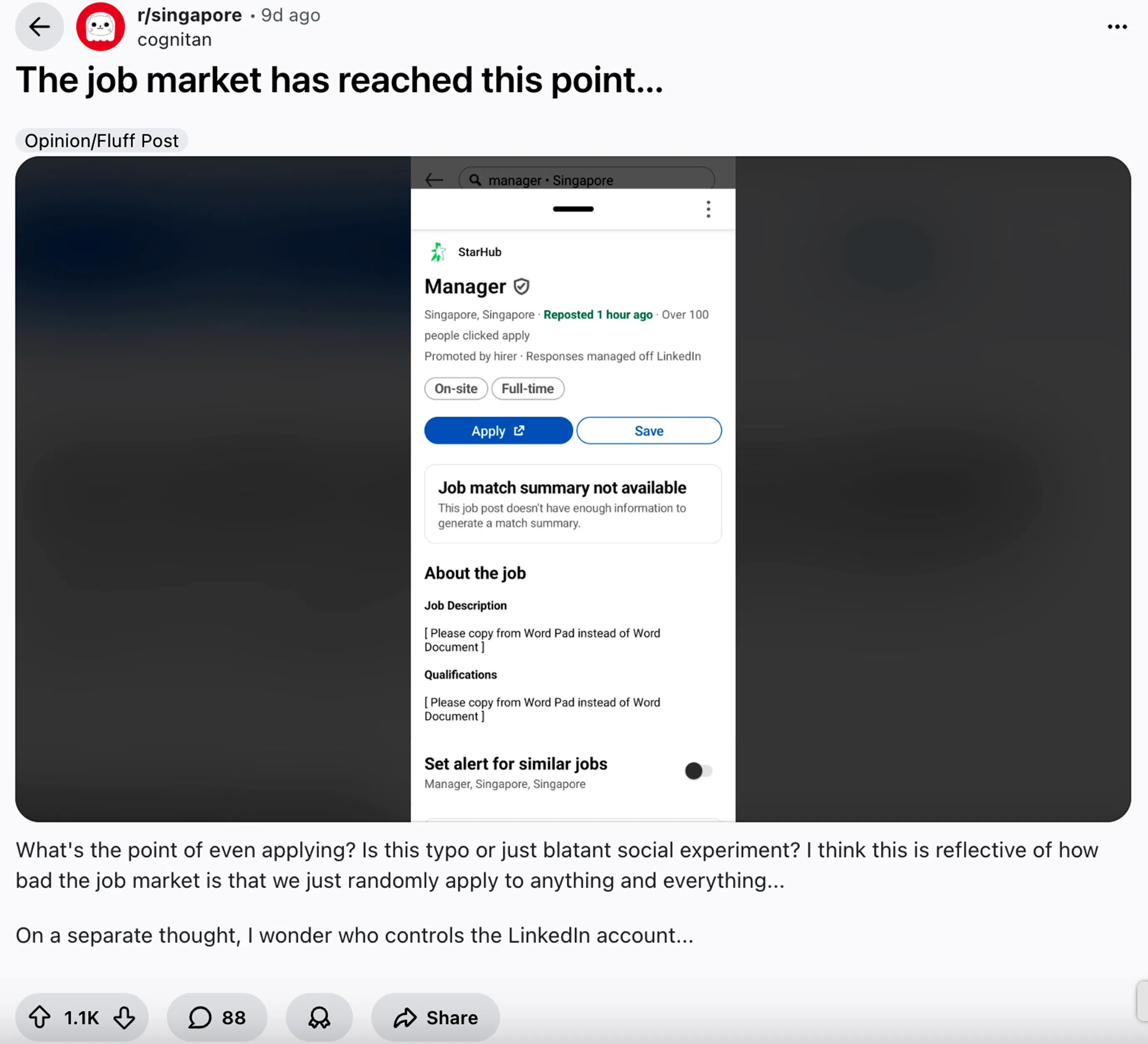- Joined
- Apr 14, 2011
- Messages
- 19,724
- Points
- 113
‘Job hugging’: Resignation rates in S’pore have reached record lows, experts say no one crisis to blame
Get ST's newsletters delivered to your inbox
The term "job hugging" has taken on new-found popularity in 2025 as a buzzword coined by consulting firms and adopted by social media users to explain their current career anxieties.
PHOTO: ISTOCKPHOTO
Follow topic:
ST HeadstartPublished Nov 15, 2025, 10:15 AM
Updated Nov 15, 2025, 10:35 AM
SINGAPORE – After more than two years in his role at TikTok, Mike (not his real name) feels trapped.
What seemed like a perfect mid-career pivot into a high-paying role in the tech sector has become increasingly intolerable. He says layoffs and restructuring exercises now happen around him at an “almost quarterly” pace.
“I’ve been feeling extremely stretched and disengaged with the work,” says the Singaporean in his 30s, who spoke under condition of anonymity out of concern it would hurt his career prospects.
“Yet, I know if I find a new role now, I’d be the first person to be laid off, as the least experienced hire,” he adds. He anticipates a downturn in 2026.
Shifting compensation and biannual performance reviews complicate the maths around leaving. These reviews come with the opportunity for bonuses and raises, adding another incentive to stick around for just a little longer.
However, though his bonuses used to be paid in cash, they now come as a mix of cash and restricted stock units (RSUs). This means conversion to actual shares or cash comes only after a vesting period or after certain milestones are met.
“If other opportunities were more certain, I might be willing to give up the RSUs, but it’s too much of a risk,” he says.
Top stories
Swipe. Select. Stay informed.
Singapore
She lives in darkness and silence due to genetic condition

Singapore
Rare skin condition gives 9-year-old girl skin like K-Pop Demon Hunters character

Life
Burnt Ends-style BBQ in Bali, Ce La Vi in Miami: Singaporean brands you might find overseas soon

Life
Eat Ping: Singaporean’s start-up delivers Asian ready meals in Britain

Asia
‘Waterfall’ in KL airport caused by contractor error during roof repair works: Malaysia Airports

Business
How families can avoid fighting over money in joint bank accounts
This is the experience that Mike and other workers like him call “job hugging” – sticking around in a job mostly out of fear, rather than loyalty.
The term has taken on new-found popularity in 2025, as a buzzword coined by consulting firms and adopted by social media users to explain their current career anxieties.
Recruiters and experts speaking to The Straits Times say that job hugging is more than just a feeling, as there appears to have been a noticeable shift in attitudes towards job-hopping in Singapore after Covid-19.
Record ‘hugging’ levels
Singapore’s average annual resignation rate hit a historic low of 1.3 per cent in 2024, according to data from the Ministry of Manpower. This is the lowest rate since the current measure – which comprises private firms with at least 25 employees as well as the public sector – was adopted in 2006.The figure dipped further to 1.2 per cent in the first two quarters of 2025.
Meanwhile, average job tenure increased from 7.3 years in 2014 to eight years in 2024.
However, job hugging is not a new phenomenon. Resignation rates have historically dipped during and after crises, such as the 2008 financial crisis – when the country slipped into a recession – and during the height of the Covid-19 pandemic in 2020.
There are other factors behind the fall in resignation rates.
Associate Professor Kelvin Seah at the National University of Singapore department of economics notes that the composition of Singapore’s economy has changed over the decades.
The growth in the number of workers here who are professionals, managers, executives and technicians (PMETs) has outpaced growth in non-PMET roles – with PMETs having lower resignation rates.
In 2024, the resignation rate for PMETs stood at 0.9 per cent. In contrast, the resignation rate for clerical, sales and service workers was 2 per cent, while the figure for production and transport operators, cleaners and labourers was 1.5 per cent.
No single crisis to blame
To Ms Michelle Koh, managing director at recruitment firm The Edge in Asia, what is distinct about today’s hiring slowdown is how no single crisis is to blame.For the human resources (HR) veteran with over 20 years of experience, the periods following financial crises and during the pandemic saw a dip in deals and transactions for recruiters, followed by a quick rebound.
“Things were bleak, but the periods that followed – ‘the great resignation’, coupled with ‘revenge hiring’ – drove record activity and profit for us,” she says.
In contrast, today’s gloomy sentiment emerged after two slow but not catastrophic years. It remains unclear if an upside is on the horizon.
Meanwhile, the effect of job hugging across industries is keenly felt by those handling recruitment and hiring, notes Ms Koh.
The norm is now longer decision cycles, more counter-offers and more candidates backing out late in the process. These all point to a risk-averse market, she says.
“We’ve seen some withdrawals at the eleventh hour, with candidates citing concerns about being the ‘last in, first out’, should the new company retrench,” says Ms Koh. “As a recruiter, I now stay closer to the candidates and do a check-in after every stage of the interview to better manage this on behalf of my clients.”
Mr Jung Foo, partner at executive search firm Pullman Morrison, who has spent 15 years in recruitment, is also seeing more caution from candidates, especially in tech, e-commerce and professional services, “where repeated restructuring and artificial intelligence (AI)-driven transformation have redefined roles”.
There are fewer junior-level roles now and a greater need for data literacy skills across the board.
While the scenario today has similarities to previous slowdowns in hiring, it feels different, he says.
“The hesitation feels psychological and structural,” he observes. “After repeated layoffs, reorganisations and AI, candidates have re-weighted stability and leadership trust over title or compensation.”
Crunch time for tech sector
Some recruiters say job hugging is particularly pronounced in the tech sector.Ms Tasha Enright, people partner at marketing and tech consultancy Algomarketing, says it is primarily driven by those in the tech sector, who are experiencing industrywide realignment after long, record-setting growth.
“What used to be a gold mine is now a race to retrenchment, as Singapore becomes the hub of redundancy for anyone working in software as a service (SaaS) or Faang or whatever you call it now,” says the HR practitioner of 13 years.
Faang refers to Meta (formerly known as Facebook), Amazon, Apple, Netflix and Alphabet (formerly known as Google) – and is a term commonly used to refer to big tech. SaaS refers to firms with business models that involve selling access to software, typically paid for via monthly subscriptions.
In her view, regional leadership roles have become harder to come by in big tech firms operating out of Singapore, and are harder to hold on to amid ever-changing key performance indicators and headcount and budget freezes. A steady stream of cost-cutting has also put many middle managers, and those working in HR and marketing, out of a job.
This is reflective of a broader trend, as tech firms increasingly prioritise automation and investing in AI and data centres.
In 2025, as at mid-November, at least 110,000 tech workers have been laid off globally, according to San Francisco-based tech industry tracker Layoffs.fyi. Still, this marks a dip from 152,922 workers in 2024 and 264,220 in 2023.
AI is waging war on white-collar jobs. It won’t end well
How HR took over the world
What’s behind job hugging today?
Experts point to a complex interplay of factors creating today’s risk-averse job market.Global developments like the United States-China trade war and rising trade tariffs, as well as advancements in AI – which now threaten to displace a myriad of job functions – are contributing factors, says Prof Seah.
Assistant Professor Chua Yeow Hwee of economics at Nanyang Technological University (NTU) notes that there is “no longer a ‘safe’ industry”, with retrenchments being commonplace across all levels and specialisations.
What results is a job market with heavier competition, which manifests as employers taking more time to shop around and going through multiple rounds of hiring to include newer, more attractive candidates.
Jobseekers and employers are also using more AI, creating a “black hole” where many feel their resumes are filtered out before they reach human eyes, says Prof Chua. All these things make it less enticing and more daunting to start job hunting.
On Reddit, one user complained in a Nov 3 post about how an error-ridden vacancy advertisement devoid of description shared on LinkedIn drew over 100 applications. The post sparked gloomy pronouncements and upvotes from over 1,000 Reddit users.
“Over 100 people applied for a job they know nothing about,” commented one.
However, it is not all negatives.
Prof Chua observes that there is now a greater focus on upskilling rather than turnover, likely as a result of government initiatives like SkillsFuture making an impact.
One should also not discount how many are experiencing a shift in career expectations, away from quick progression and towards more lasting job satisfaction and stability.

One error-filled but popular job vacancy drew gloomy pronouncements about the job market on Reddit.
PHOTO: SCREENGRAB FROM REDDIT
This shift, too, manifests on social media. The year 2023 saw the viral term “lazy girl jobs” emerge on TikTok. In contrast to hustle culture, this term refers to easy, typically white-collar jobs that pay well, without a stressful workload or competitive culture.
Throughout 2024, Singapore netizens increasingly began seeking advice online on how to land such a job.
“Get those admin/accounts jobs in the finance industry,” wrote one user on Reddit. “My sis got an HR-cum-accounts position with a boutique investment firm with less than 10 staff, they pay her $5,000 to sit in an empty office at Clarke Quay since everyone else either WFH (works from home) or is out for sales.”
Closely related terms “quiet quitting” and “tang ping” (lying flat) were
referenced by Prime Minister Lawrence Wong on
Sept
24.
This was during the debate on the President’s Address, as part of a global trend of youth responses to career anxiety, which he said Singaporeans should not succumb to.
National Wages Council proposes 5.5% to 7.5% pay rise for lower-wage workers in new guidelines
An era of possibility: Renewing economic order and shared purpose
How fear shapes careers
There is also another driver behind job hugging that is rooted in people’s psyches.That is loss aversion, says NTU economics professor Nattavudh Powdthavee, as humans tend to experience losses more painfully than they feel pleasure at equivalent gains.
This means many stick around in jobs that are comfortable – but not deeply fulfilling – out of a fear that the alternative might be worse.
Another psychological factor is the “region-beta paradox”, Prof Nattavudh adds. This refers to how someone in a truly awful job is more likely to reach a breaking point and quit, thereby finding a new role that is more fulfilling.
In contrast, someone whose situation is more tolerable is more willing to stay in his or her “so-so” job for far longer.
Dr Tan Kim Lim, senior lecturer at James Cook University Singapore’s business school, draws parallels to a bygone era when job-hopping was less of a norm and being a “company lifer” who stayed for decades was common.
What is different about today, he says, is that job hugging results from pragmatism and self-preservation, not company loyalty.
There are hidden costs to this. Those who stick around for too long – without upskilling or progressing – can find their skills becoming increasingly obsolete, and their job prospects less competitive compared with their job-hopping peers.
Falling turnover rates can also hurt companies. While it can mean better institutional memory, if not managed well, job hugging can translate to stagnation, internal echo chambers and “quiet disengagement”.
For TikTok worker Mike, fear colours his decision to stay.
As he hopes to settle down soon and have children, it feels financially irresponsible to leave for a lower-paying but more stable job. “I want to set up a financial safety net for my future children, especially since the cost of living – healthcare, housing, et cetera – and the job market are likely to be even more dire for them,” he says.
“At this point, I think a layoff will come as a blessing and force me into a new and possibly more fulfilling opportunity.”




